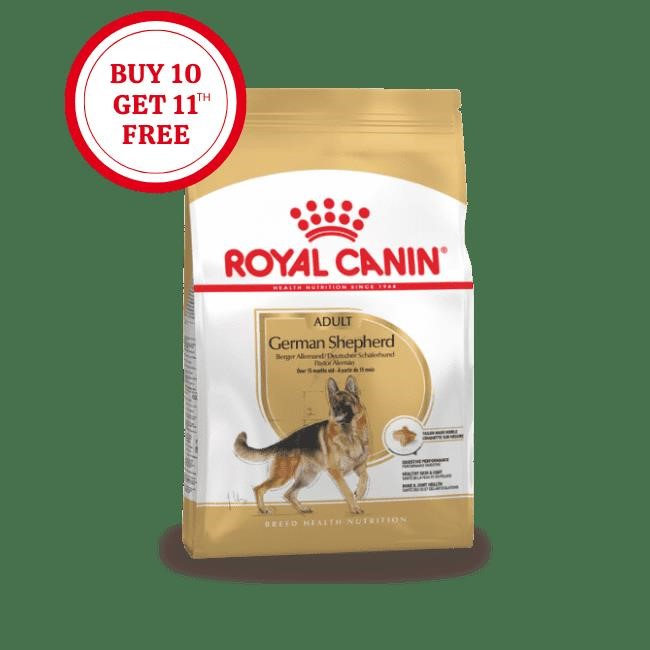German Shepherd Feeding Guide⁚ A Comprehensive Overview
This guide covers nutritional needs from puppyhood to adulthood․ We’ll explore optimal food choices‚ feeding schedules‚ and addressing specific dietary requirements‚ ensuring your German Shepherd thrives․ Learn about top brands and homemade options․
Choosing the Right Puppy Food
Selecting the right puppy food is crucial for your German Shepherd’s healthy growth and development․ Look for high-quality kibble specifically formulated for large breeds․ These formulas typically contain a balanced ratio of calcium and phosphorus to support strong bone development‚ preventing skeletal issues common in large breeds․ The first ingredient should be a whole protein source‚ such as chicken‚ lamb‚ or fish․ Avoid foods with fillers‚ artificial colors‚ and preservatives․ Consider your puppy’s age and activity level; high-energy puppies will need more calories․ Consult your veterinarian for personalized recommendations based on your puppy’s unique needs and any pre-existing health conditions․ They can help you choose a brand that meets the AAFCO standards for complete and balanced nutrition․ Remember‚ transitioning to adult food should be a gradual process to avoid digestive upset․
Top Dry Food Brands for German Shepherd Puppies
Many reputable brands offer excellent dry food options for German Shepherd puppies․ Royal Canin and Eukanuba are frequently recommended for their breed-specific formulas designed to meet the unique nutritional needs of this breed․ These brands often incorporate ingredients that support healthy joint development and strong bones․ Other popular choices include Purina Pro Plan‚ specifically their large breed puppy formulas‚ and Hills Science Diet‚ known for its focus on precise nutritional balance․ Diamond Naturals also offers a large breed puppy food featuring easily digestible ingredients suitable for sensitive stomachs․ When choosing a brand‚ always check the ingredient list‚ ensuring a high-quality protein source is listed first‚ followed by whole grains and healthy fats․ Remember to consult with your veterinarian; they can provide tailored advice based on your individual puppy’s needs and any potential health concerns․
Nutritional Needs of German Shepherd Puppies
German Shepherd puppies‚ being a large breed‚ have specific nutritional requirements to support their rapid growth and development․ They need a diet rich in high-quality protein to build and maintain strong muscles․ The protein source should be easily digestible‚ such as chicken‚ lamb‚ or fish․ Essential fatty acids‚ like omega-3 and omega-6‚ are crucial for healthy skin and coat‚ as well as brain development․ Adequate calcium and phosphorus are vital for proper bone growth and prevent skeletal issues common in large breeds․ The calcium-to-phosphorus ratio should be carefully balanced; an imbalance can lead to developmental orthopedic disease․ Vitamins and minerals are also essential for overall health and immune function․ Puppies require more frequent‚ smaller meals to accommodate their high energy levels and rapid metabolism․ Avoid feeding foods containing artificial colors‚ flavors‚ or preservatives‚ as these can potentially cause digestive upset or allergies․ Consult your veterinarian to determine the ideal calorie intake for your puppy‚ based on its age‚ weight‚ and activity level․
Feeding Schedule for Puppies (by Age)
Feeding frequency and portion sizes for German Shepherd puppies vary significantly with age․ From 8 weeks to 3 months‚ aim for four meals daily‚ gradually decreasing to three meals by 6 months․ By 12 months‚ most puppies can transition to two meals per day․ The exact amount of food per meal depends on factors like the puppy’s weight‚ activity level‚ and the calorie density of the chosen food․ Always follow the feeding guidelines on the chosen food packaging‚ but remember that these are only estimates․ Observe your puppy’s body condition; a healthy puppy should have a clearly defined waist and ribs easily palpable‚ but not visible․ Adjust food portions up or down as needed to maintain a healthy weight․ Avoid free-feeding (leaving food out all day); it can contribute to overeating and obesity․ Consistent mealtimes also help establish a routine․ If you’re switching foods‚ do so gradually over 7-10 days to prevent digestive upset․ Consult your veterinarian if you have any concerns about your puppy’s weight or appetite․ Regular veterinary checkups are essential for monitoring growth and development․
Transitioning to Adult Food
Switching your German Shepherd from puppy food to adult food is a crucial step‚ typically starting around 12-15 months of age‚ but it can extend to 24 months depending on the dog’s growth rate․ Abrupt changes can upset their digestive system‚ so a gradual transition is essential․ Begin by mixing small amounts of adult food with their regular puppy food․ Over 7-10 days‚ slowly increase the proportion of adult food while decreasing the puppy food until your dog is eating only the adult formula․ Monitor your dog closely during this period for any signs of digestive upset‚ such as diarrhea or vomiting․ If problems occur‚ slow down the transition process or consult your veterinarian․ Choosing the right adult food is also vital; it should be formulated for large breeds to support joint health and manage their energy levels․ Consider your dog’s individual needs‚ such as allergies or sensitivities․ A balanced diet includes high-quality protein‚ healthy fats‚ and essential nutrients․ Remember that even after the transition‚ regular veterinary check-ups remain crucial for monitoring your German Shepherd’s health and addressing any potential dietary concerns;

Adult German Shepherd Nutrition
Maintaining a healthy adult German Shepherd requires a balanced diet․ This section details optimal food choices‚ dietary considerations‚ and supplement options for a long and healthy life․

Best Dry Food Brands for Adult German Shepherds
Selecting the right dry food for your adult German Shepherd is crucial for their health and well-being․ Many reputable brands offer formulas tailored to large breeds‚ addressing specific needs like joint health and maintaining ideal weight․ However‚ “best” is subjective and depends on individual factors․ Consider factors such as your dog’s age‚ activity level‚ and any pre-existing health conditions when making your selection․ Always check the ingredient list; prioritize high-quality protein sources like chicken‚ beef‚ or lamb‚ as the primary ingredient․ Avoid fillers and artificial additives․ Some popular choices frequently mentioned online include Royal Canin‚ Purina Pro Plan‚ and Eukanuba‚ but researching various brands and reading reviews is advisable․ Consult your veterinarian for personalized recommendations based on your dog’s unique needs․ They can help you navigate the many options and select a diet that supports your German Shepherd’s optimal health throughout their adult years․ Remember to gradually transition to any new food to avoid digestive upset․
Dietary Considerations for Adult GSDs
Adult German Shepherds‚ known for their size and energy‚ require a balanced diet to maintain their health․ Maintaining a healthy weight is paramount; obesity can significantly impact their joints and overall well-being; Portion control is key‚ and regular exercise should complement their nutritional intake․ The breed’s predisposition to hip and elbow dysplasia necessitates a diet rich in glucosamine and chondroitin‚ supporting joint health․ Consider the protein content; German Shepherds need a sufficient amount to maintain muscle mass and energy levels․ However‚ excessive protein might not be beneficial for all dogs․ High-quality fats‚ like those found in fish oil‚ are essential for skin and coat health․ Always monitor your dog’s stool consistency; changes may indicate a need for dietary adjustments․ If your German Shepherd exhibits food sensitivities or allergies‚ a veterinarian can assist in identifying appropriate alternatives and recommend a hypoallergenic diet․ Remember to provide fresh water at all times and avoid abrupt dietary changes․ Regular veterinary check-ups are crucial to monitor your dog’s health and make necessary adjustments to their dietary plan․
Homemade Diet Options for German Shepherds
While commercial dog foods offer convenience‚ a homemade diet can provide tailored nutrition for your German Shepherd․ However‚ careful planning is crucial to ensure balanced nutrition․ Consult a veterinary nutritionist to create a recipe meeting your dog’s specific needs and life stage․ A well-balanced homemade diet typically includes lean protein sources like chicken‚ turkey‚ beef‚ or fish․ Incorporate a variety of vegetables for essential vitamins and minerals‚ such as carrots‚ green beans‚ and sweet potatoes․ Whole grains like brown rice or oats provide fiber and energy․ Healthy fats are vital; include sources like fish oil or flaxseed oil for skin and coat health․ Calcium and phosphorus ratios are critical for bone development and should be carefully balanced․ Avoid bones‚ as they can splinter and cause internal injuries․ Introduce new ingredients gradually to monitor for potential allergies or digestive upset․ Consistent monitoring of your dog’s weight‚ energy levels‚ and stool quality is essential to ensure the homemade diet remains effective․ Regular veterinary check-ups are necessary to assess your dog’s overall health and ensure the homemade diet is meeting all nutritional needs․ Supplementing with vitamins and minerals may be necessary to ensure complete nutritional coverage‚ depending on the specific recipe․ A well-formulated homemade diet‚ under professional guidance‚ can be a healthy option for your German Shepherd․
Supplements and Treats
While a complete and balanced diet should provide most necessary nutrients‚ supplements can address specific needs․ Consult your veterinarian before adding any supplements to your dog’s diet to avoid potential interactions or imbalances․ For instance‚ fish oil supplements may support skin and coat health‚ while glucosamine and chondroitin can aid joint health‚ particularly important for large breeds like German Shepherds prone to hip dysplasia․ Probiotics can improve gut health and digestion․ However‚ overuse can lead to digestive upset․ Always choose high-quality supplements from reputable brands․ Treats should be given sparingly‚ as they contribute to your dog’s overall calorie intake․ Opt for low-calorie‚ healthy options․ Small pieces of cooked chicken or carrots are good alternatives to commercially produced treats‚ many of which contain high levels of sodium‚ preservatives‚ and fillers․ When choosing commercial treats‚ read the ingredient list carefully‚ avoiding those with artificial colors‚ flavors‚ or preservatives․ Remember‚ treats should complement a balanced diet‚ not replace it․ Excessive treats can lead to weight gain and obesity‚ increasing the risk of health problems․ A well-balanced diet‚ combined with appropriate exercise and veterinary care‚ forms the foundation of your German Shepherd’s health and well-being․
Addressing Specific Dietary Needs (Allergies‚ Sensitivities)
German Shepherds‚ like other breeds‚ can develop food allergies or sensitivities․ Common symptoms include itching‚ skin rashes‚ digestive upset (vomiting‚ diarrhea)‚ and ear infections․ If you suspect your dog has a food allergy or sensitivity‚ consult your veterinarian immediately․ They can perform tests to identify the culprit․ Elimination diets are often used‚ where you remove suspected allergens (e․g․‚ chicken‚ beef‚ dairy‚ wheat) from your dog’s diet‚ one at a time‚ observing for symptom improvement․ Once the allergen is identified‚ it must be strictly avoided․ Your vet may recommend hypoallergenic diets‚ formulated with novel protein sources (proteins your dog hasn’t been exposed to before) or hydrolyzed proteins (proteins broken down into smaller‚ less allergenic peptides)․ These diets are often more expensive but can be life-changing for dogs with severe allergies․ Always transition to a new diet gradually to avoid digestive upset․ Regular monitoring of your dog’s symptoms and close collaboration with your veterinarian are essential for managing food allergies and sensitivities effectively․ Remember that even seemingly minor changes to your dog’s diet can have a significant impact on their health․ Ignoring potential sensitivities can lead to chronic health issues․